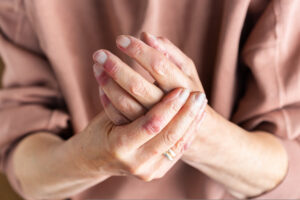Articles
By Angela Ballard, RN
Published On: Sep 24, 2022
Last Updated On: Feb 28, 2023
Your skin is your first line of defense against the outside world — fending off germs, chemicals, allergens and more. But if you have eczema, your skin barrier may be weakened, leading to a cycle of uncomfortable dryness, irritation and inflammation, symptoms which, on their own, can contribute to even further skin barrier degradation, worsening symptoms and so on.
Fortunately, when you understand more about your skin barrier, you can take steps to strengthen it for relief of your eczema.
The human skin barrier is basically the uppermost layer of skin containing, among other things, skin cells and specialized immune system cells which make up a physical and functional protection system. Like a wall, this system works to recognize and keep out intruding organisms and substances.
With eczema, however, the skin barrier can’t function as effectively and may be “leaky.” There are a number of reasons for this. One is that many people with eczema actually have differences in the gene that codes for a key protein called filaggrin. In fact, according to the National Institutes of Health (NIH), up to 30% of eczema patients have mutations in the gene for filaggrin. Filaggrin helps structurally, binding keratin filaments together to strengthen and flatten skin cells. If you don’t have enough functioning filaggrin, skin cells can lose moisture, shrink and develop gaps between them (effectively leaving “holes” in the wall of your skin). With loss of moisture, skin also becomes dry and itchy, leading you to scratch or rub, which can further weaken the skin barrier. Inadequate filaggrin production can also impact the skin’s pH, allowing abnormal bacterial growth that can prompt immune responses like inflammation.
Lipids are another important part of your skin barrier. In people with eczema, skin lipids can have a slightly different composition and contain less ceramide, a substance that’s important for locking in moisture. According to a scientific review in the journal Allergy, Asthma & Immunology Research, differences in lipids and inadequate ceramide in people with eczema contribute to dryness, irritation and skin dysfunction.
While this might all sound a bit complicated, Dr. Amy Paller, chair of the department of dermatology at Northwestern’s Feinberg School of Medicine, offers some simple advice to help your skin barrier: “If you are experiencing an active eczema flare, treat it.” Inflammation and dryness, she explains, can ruin your skin barrier so you need to address symptoms correctly with the help of your healthcare professional.
They will likely include the following three things as part of an eczema management and skin-barrier-fortifying regimen:
- Moisturizing. When you keep your skin moist you improve barrier function. For more severe dryness, experts with the American Academy of Pediatrics recommend moisturizing after short “soaks” in a lukewarm bath. Thick ointments or creams may be preferable to lotions to prevent skin from drying out while protecting it from irritants. Products may contain ceramides or vitamin B3. Don’t apply barrier creams to broken skin.
- Minimizing exposure to allergens, irritants and your typical triggers. Common eczema triggers include: dry skin, dust, pet dander, pollen, metals like nickel, cigarette smoke, soaps and household cleaners, fragrances, fabrics like wool and polyester, certain chemicals, dry air and stress. People with eczema tend to have an overactive immune system that when triggered outside or inside the body, responds by producing inflammation. This inflammation can lead to red, itchy or painful skin, a situation that can be both a symptom of and contributor to a weakened skin barrier. This is where the cycle of skin barrier dysfunction kicks in. With eczema, your skin barrier is likely weakened, meaning it is more likely to allow allergens, irritants and triggers to impact it and degrade the barrier even further. The more your skin barrier is weakened, the more irritants and even microorganisms are able to invade and cause problems – like stronger reactions or infections. Your best bet? Try to avoid triggers and break the cycle.
- Bathing for skin barrier repair and regulation. Regular, gentle bathing helps remove irritants and dead skin cells so the skin barrier can work to repair itself. Non-soap cleansers, which are low in pH and hypoallergenic, are recommended rather than soap, as they cause less disruption to the skin barrier. Soak in lukewarm water for 10 to 15 minutes, which is long enough to rehydrate but not so long as to further weaken the skin barrier significantly. Apply moisturizer soon after bathing. Consider “soaking and smearing” where you soak affected areas then cover them with ointment. Even topical corticosteroids can be applied to wet skin, immediately after baths, to help capture moisture while also improving medication delivery. For additional benefits, incorporate occasional bleach baths. While most people think bleach baths help skin because they’re antibacterial and antifungal, the greater benefit may actually be in their anti-inflammatory properties and ability to help balance skin pH. Dr. Paller says her patients see improved skin barrier function with bleach baths, “My patients tell me this is the best thing they’ve started to do and it’s so easy.”
To incorporate bleach baths into your routine, the National Eczema Association recommends ¼ – ½ cup of common 5% household bleach added to a bathtub full of lukewarm water. Soak for no more than 10 minutes two to three times a week. Do not submerge your head and, of course, be careful to avoid getting any of the bath water into your eyes. Supervise children carefully. Rinse off with fresh water and apply moisturizer. If a bleach bath feels uncomfortable because your skin is extremely dry or inflamed. “You can ease discomfort by getting into the bath with dressings still on,” says Dr. Margaret Lee, an instructor in Dermatology at Harvard Medical School and pediatric dermatologist at Boston Children’s Hospital. “This will allow the skin to re-equilibrate and help alleviate some of that initial discomfort of getting into the bath, before you start pulling the wraps off. Another way to help tolerate getting into bleach baths is to put a little antibacterial ointment or petroleum jelly in the cracks of the skin.” Of course, if in doubt, talk to a healthcare professional about whether bleach baths are right for you. More advice on bleach baths can be found here.
Even during an eczema flare, remember, your skin barrier is still doing powerful work to keep your whole body safer and healthier. Nurture it when you can and it will nurture you back.






